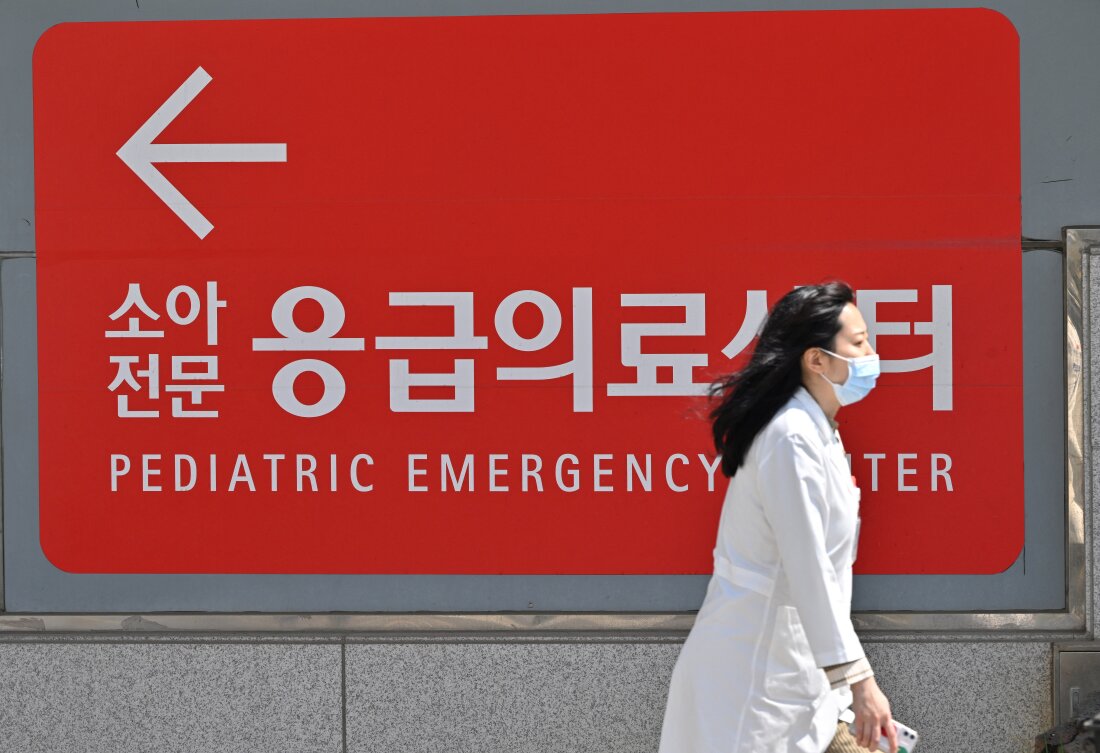As medical strike drags on in South Korea, sufferers are on edge : NPR


A medical employee walks previous an indication for a pediatric emergency heart outdoors a hospital in Seoul on April 1.
Jung Yeon-Je/AFP by way of Getty Pictures
disguise caption
toggle caption
Jung Yeon-Je/AFP by way of Getty Pictures
SEOUL, South Korea — Shortly after South Korean President Yoon Suk Yeol introduced a plan to extend the variety of medical doctors in February, his approval fee received a bump.
The fast-aging nation was already seeing a scarcity of medical doctors in rural and distant areas, and demand for well being care is rising.
So the general public was largely on board with the federal government on the difficulty, whilst greater than 10,000 trainee medical doctors walked off their jobs in protest, saying the federal government’s proposal wouldn’t remedy the issue.
Seven months have handed since, and the medical doctors haven’t returned. That very same plan so as to add 2,000 medical college students every year is now the largest motive individuals disapprove of Yoon’s efficiency in the weekly Gallup ballot. Almost eight out of 10 individuals say they’re afraid they gained’t be capable of obtain medical care after they get sick. Yoon’s approval fee is the bottom since he took workplace.
Because the standoff between the federal government and putting medical doctors continues, there are actually indicators that South Korea’s well being care system is buckling beneath the pressure.
Main hospitals are conducting 16% fewer most cancers surgical procedures this 12 months. Emergency responders are struggling to seek out hospitals that may take sufferers in, and a handful of emergency clinics nationwide have partially suspended operations.
The federal government has downplayed the severity of the state of affairs, with Yoon saying at a latest coverage briefing that the medical system is “working easily.” However sufferers and their households say they really feel helpless and anxious not understanding when the disaster will finish.
Suh Yiseul scheduled her son’s biopsy simply earlier than the strike started. Her 11-year-old Kai wished to begin a brand new remedy to deal with his Klippel-Trenaunay Syndrome, a uncommon blood vessel dysfunction that causes ache and makes his legs swell and develop asymmetrically. Checking for genetic mutation can be step one for the therapy.
However the biopsy was delayed from April to Could, after which to September, because of workers shortages. And this month, simply hours earlier than the appointment, she received a textual content message from the hospital notifying of one more delay. The hospital stated it had no beds left for baby sufferers.
“Even when we do the biopsy now, we can’t get the outcomes earlier than subsequent spring. And my baby will proceed to harm within the meantime. He will get cellulitis each time the seasons change. And the distinction within the size and thickness of his legs retains rising,” Suh says.
No decision to the strike is presently in sight. The federal government is pushing forward with its plan so as to add 2,000 extra college students to the present quota of round 3,000 in subsequent 12 months’s medical faculty admission. Physician teams demand the plan be referred to as off solely. Neither facet is prepared to even interact in a dialogue until the opposite facet offers in.
It would take years for the expanded batch of recent graduates to reach in hospitals and ease the labor scarcity. In the meantime, present medical college students are boycotting courses and licensing examinations in solidarity with the trainee medical doctors, and coaching hospitals barely obtained any candidates for his or her summer time recruitment.
The departure of almost 9 out of 10 coaching medical doctors has been disruptive to the nation’s largest common hospitals, as a result of they make up round 40% of physicians there.
And, in response to the intern and resident medical doctors, that construction is why they reject the federal government’s reasoning that having extra medical doctors will enhance medical entry throughout areas and medical sectors.
They say that their lengthy work hours and low wage has propped up South Korea’s well being care system, which they are saying undercompensates medical care that tends to important bodily capabilities corresponding to inside medication, emergency care, cardiac surgical procedure, obstetrics and pediatrics.
With out a reform of that system, they are saying, hospitals will proceed to underinvest in these fields of medication and depend on trainee medical doctors’ low cost labor to run them. Working situations in these fields will maintain deteriorating, they are saying, and medical doctors, nevertheless many there are, will proceed to shun them.
Below the extremely commercialized well being care system in South Korea, assets are concentrated in worthwhile fields like beauty surgical procedure and dermatology, says Lee Sang Yoon, a senior fellow on the civic analysis group Middle for Well being and Social Change.
He says rising the variety of public hospitals generally is a answer. In line with information from the nation’s well being ministry, solely about 5% of all medical establishments in South Korea are publicly owned — far decrease than the typical of over 50% amongst member states of the Group for Financial Cooperation and Improvement (OECD).
However Lee is skeptical that the medical doctors would conform to such a basic reform after they have so strongly resisted rising medical faculty admissions.
He says South Korean medical doctors are certainly overworked, citing the nation’s comparatively low variety of medical doctors per capita in contrast with different OECD international locations.
However South Korean medical doctors on common get pleasure from excessive incomes compared to different prosperous international locations. Lee argues medical doctors’ nervousness over dropping that compensation as soon as the availability of medical doctors will increase is a part of the explanation they’re opposing the hike.
And he says the federal government is papering over the advanced tangle of pursuits and basic issues with a “populist” method of highlighting the difficulty of medical doctors’ numbers and labeling medical doctors as a “cartel.”
Even when the medical doctors find yourself prevailing over the federal government, Lee provides, they are going to have misplaced the belief of sufferers and residents. “Well being care is a system primarily based on belief,” he says. “It would doubtless be a victory in identify solely.”







